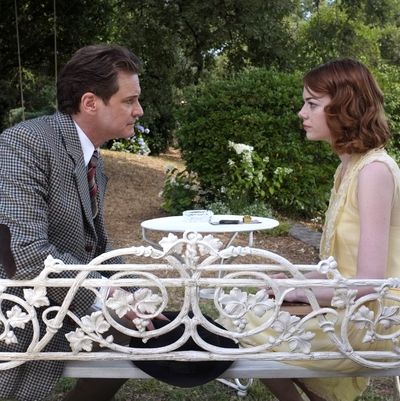
The year’s inevitable Woody Allen film, Magic in the Moonlight, has a clever premise, an agreeable cast, delectable ‘20s period recreations of faux “Oriental” magic shows and Côte d’Azur garden parties, and an ever-slackening pulse. It starts off with a flourish and winds up limp, like a rabbit pulled out of a hat that turns out to be dead.
Having gotten away with his last, more difficult trick — remaking A Streetcar Named Desire, except with zero sympathy for the protagonist — Allen probably thought that this one would be a cinch to put over. His hero, played by Colin Firth, is a British magician named Stanley who performs in a bald cap and Fu Manchu mustache as “Wei Ling Soo” — and is instantly recognizable from his crisp, misanthropic attack as Professor Henry Higgins. His Colonel Pickering is a magician named Burkan (Simon McBurney) who invites him to the South of France to see — and expose — a young American spiritualist (Emma Stone) who travels the world with her mother (Marcia Gay Harden), convincing wealthy people she can talk to the dead. The girl, Sophie, has all the hammy, fluttery moves of a fake, but her knowledge does, indeed, seem uncanny, and Stanley can’t for the life of him spot the trickery. Perhaps — perhaps — his certainty that death is absolute, humans are either swindlers or cretins, and God doesn’t exist (“I think Mr. Nietzsche has disposed of the God matter rather convincingly!”) is wrong. Perhaps this charming little creature will be his savior.
However fanciful, the story is rooted in the real, hallowed history of the Skeptic movement. When spiritualism was the rage, it was magicians like Houdini who proved most successful in spotting the deception. Houdini pointed out that scientists and rationalists (among them, famously, Arthur Conan Doyle) overvalued the evidence of their senses, which he knew were amazingly easy to fool. The most irresistible scenes in Magic in the Moonlight are relatively straight comic setpieces in which Sophie shows off her powers (in readings and séances) and Stanley fumes at his inability to see how she’s doing it. He insults her, carries on about her perfidy to Pickering (I mean Burkan) and his old aunt (Eileen Atkins, who sounds exactly like Higgins’s mother), and wonders — to his deep chagrin — if he’s falling for her.
Allen doesn’t do “mere” comedy anymore, though: There must be an old-fashioned philosophical drama at the heart of the story. Thus, Stanley and Sophie debate whether it’s better to believe in something that can’t be proven scientifically — or might even be a scam — than to believe in absolutely nothing. These musings — which feel shoehorned in — alternate with remarkably flaccid romantic banter and several replays of an old recording of Cole Porter’s “You Do Something to Me.” Stone seems to have chemistry with everyone, but there’s nothing going on between her and Firth. I blame the role, not the actress. Sophie has to be both supremely manipulative and an indecisive ingenue. She’s an obvious construct, and the 28-year difference between her and Firth doesn’t help. (Firth barely looks at Harden, who is his own age, and Allen doesn’t bother to give the older woman many lines.) I know, Rex Harrison didn’t belong with Audrey Hepburn either, but the characters had been through a lot more together — and those were different times.
Magic in the Moonlight is smoothly made, and you can feel Allen’s reverence for the settings, the cars, the clothes, and even for the privilege of channeling characters created by G.B. Shaw. Pygmalion’s Freddy — here called Bryce and described by Stanley as “the young milksop” — is expertly played by Hamish Linklater, who has a gift for singing love songs to Sophie that are just off-key enough to be excruciating. Stone looks airily gorgeous in her flapper dresses and a little red sailor suit. But nothing can make Firth’s effusions — “How wonderful you make me feel! Elated by life!” — seem the slightest bit motivated. Allen thinks he’s some kind of magician, but his sleight of hand is sclerotic.


